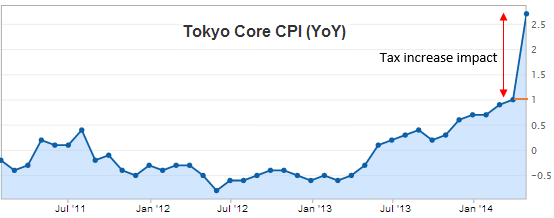Myth of a Japanese economic recovery
Japan raised its consumption tax rate in 1997 - a recession soon followed as well as a deflationary spiral which has lasted to this day. With this month's hike in the consumption tax from 5% to 8%, investors are fearful that history may repeat itself.
This fear ignores several key differences. First, there's no Asian currency crisis to deal with now, unlike in 1997. Second, Japan's banks are in much better shape than during the 1990s when they held off writing off bad debts. Third, the central bank is engaged in a massive experiment in monetary stimulus this time around. Finally, today's labor market is very tight, compared to back then.
The last point is crucial and goes to the heart of one of the biggest myths about Abenomics. That is, with or without Shinzo Abe, Japan's sharply declining working-age population was always going to lead to a tight labor market, resulting in wage pressure and higher inflation. Today's post will attempt to show that the tipping point for higher wages is near.
In addition, you should see even more stimulus enacted in the coming months as the economy slows. This stimulus - of a gargantuan amount in aggregate - combined with higher wages, may be enough to push inflation higher.
But Japan's government and central bank are likely to get much more inflation than they bargained for. This risks a sharp spike in interest rates and a bond market rout, with investors fleeing amid concerns about the government's ability to repay its enormous debt load.
In the ultimate irony, it may not be the deflationary bogey man which finally kills the Japanese economy. Rather, it could be the inflation so beloved by central bankers and economists that does it.
Myths of a Japanese recovery
It's amazing the extent to which mainstream commentary has embraced the narrative that Abenomics is working and the Japanese economy is recovering. That's despite almost all of the recent economic data suggesting otherwise.
Let's run through this data. First, Japan posted its largest-ever trade deficit during the fiscal year to March. The gap between the value of Japan's exports and its imports grew by more than two-thirds to 13.7 trillion yen (US$134 billion). Gains in exports were almost solely due to the declining yen as export volumes were only up 0.6% for the year. And during the January to March quarter, export volumes were actually down 0.2% in seasonally-adjusted terms.
Meanwhile, import volumes increased 2.4% for the year. But the yen value of imports rose 17.3%. The import strength was partially due to the shutdown of all of the country's nuclear reactors after the Fukushima nuclear accident in 2011. That's meant 30% of Japan's power needs has been taken offline. And utilities have had to buy from overseas to plug the gap, with a lower yen making it much more expensive to do so.
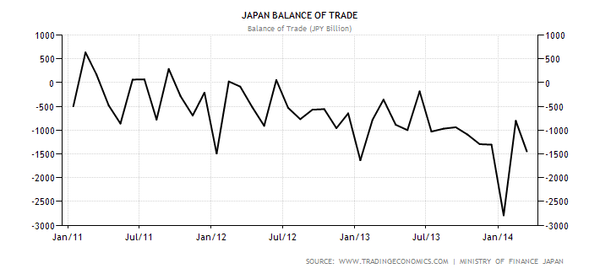
In addition, many news publications hailed Tokyo consumer prices rising at the fastest pace in 22 years in April. Another sign of Abenomics working, apparently. Or not, as the case may be.
Because the increase was solely due to the implementation of the rise in the consumption tax rate. Strip the impact of the tax out, and tax-adjusted consumer prices grew just 1% versus the 2.7% headline number. The tax-adjusted figure was unchanged from the previous month and below market expectations, as the below chart from Sober Look shows.
 |
Consumer sentiment is also poor. The Economic Watchers Survey for March reported a 6.8pt month-on-month increase in the household activity-related index for current economic conditions. There's little doubt the increase reflected last-minute demand before the consumption tax rise.
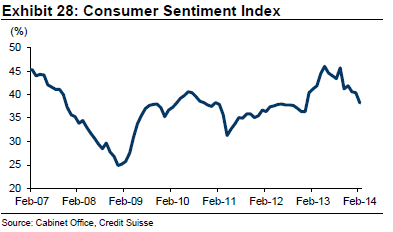 |
Part of the reason for the pessimism is likely due to the fact that wages are still going nowhere. Total cash earnings were flat in February, after being down 0.2% in January.
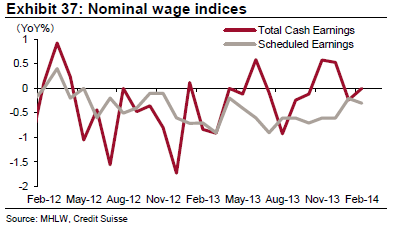 |
There have been a couple of positive data points. Retails sales were brisk in the lead-up to the tax rise. Unfortunately, the signs aren't as good post the tax hike going into effect. Isetan Mitsubishi, an upmarket department store chain, reported a 13% decline in sales in the first six days of this month.
The other bright spot has been on the jobs front. The unemployment rate declined 0.1pt to 3.6% in February, as the total number of people employed expanded by 130,000.
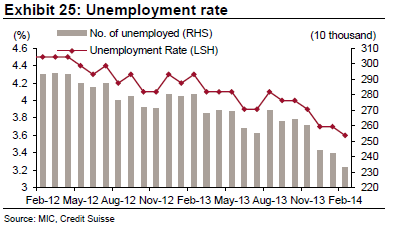 |
All up, the economic data have shown a marked deterioration over the past 3-6 months. And investors are worried that this trend will continue.
More stimulus soon
A further slowing in the economy will almost certainly push the Bank of Japan (BoJ) into printing more money in a bid to kick-start growth. Probably by July this year.
Earlier this month, the BoJ held off from adopting more stimulus, citing a moderate economic recovery and progress towards its 2% inflation rate target (currently 1.3%). It suggested capital expenditure in the public and private sectors had picked up and household consumption and investment had proven resilient.
As a consequence, the BoJ voted unanimously to keep monetary stimulus at an annual pace of 60-70 trillion yen (US$583-680 billion). This came as no surprise as central bank officials had hinted on several occasions that the economic "recovery" would be strong enough to withstand the VAT hike.
In our view, he BoJ would make even the best PR agency blush. All of its talk of economic recovery makes for great propaganda but bears little resemblance to the facts. Because of this, you can soon expect a U-turn and for more stimulus to be approved.
And to put the Japanese stimulus into perspective, it's currently around 3x the quantum of the US-equivalent versus the size of its economy. It's an extraordinary experiment of a scale rarely seen in modern times (and given the money printing habits of today's central bankers, that's saying something).
Wage growth around the corner
However, Asia Confidential thinks higher inflation is coming to Japan, with or without an economic recovery. To understand why, let's provide some context.
There are a number of myths regarding Japan's economic performance since 1990. I agree with the very smart Andrew Smithers, who suggests Japan's economy hasn't done badly since that time.
Judging the country's economy purely by GDP is a mistake, as Japan has a falling and ageing population (remember GDP equals productivity growth plus working-age population growth). If you adjust for this, Japan has actually been the best performing of all Group of Five leading economies. That is, Japan's GDP at constant prices per working person has grown the most.
And here's what will surprise most people. By this same measure, Japan has outperformed the US economy over the past 15 years.
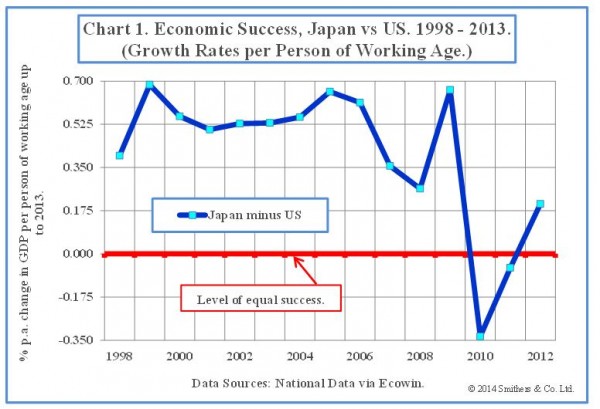 |
This leads to a second myth: that deflation is the principal cause of Japan's slowing GDP. As Smithers shows, demographics have played a larger part. After all, Japan's working-age population peaked in 1997.
I will add a final myth to Smithers' list: that massive money printing is needed to beat deflationary forces in Japan. On the contrary. Our view is that an extraordinarily tight labor force is almost guaranteed to lead to wage growth over the next 2-3 years.
Japan's working age population has decreased from 69 million in June 1997 to 65 million now. Those aged 15-24 have plummeted from 8.9 million to 4.9 million over the same period.
This has contributed to the falling unemployment rate, as noted above. The number of open positions per job seeker in Japan is 1.04. JP Morgan suggests that ratio will rise to 1.5 by 2017, the highest since 1974.
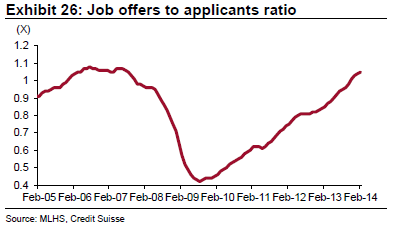 |
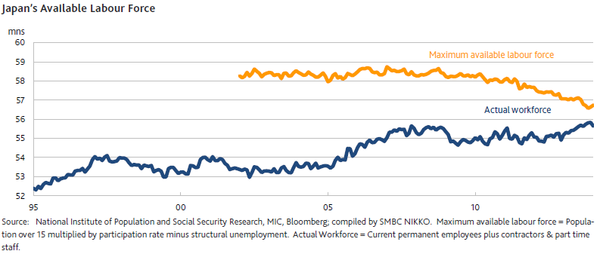 |
Now, this tight labor force hasn't yet resulted in higher wages. The Prime Minister is pressuring companies to raise wages in his bid to lift inflation. But our view is that this isn't necessary: ageing demographics and the declining working-age population will do the trick anyhow.
Put simply, the odds favour Japan getting higher inflation. It's a matter of when, not if. Abenonics will simply serve to accelerate this process.
Positives from inflation...
Mainstream economists bow at the alter of inflation. Apparently, inflation is central to economic growth. Not only does this defy common sense but also many periods throughout history where strong economic growth has been accompanied by deflation.
That said, higher inflation in Japan may provide some benefits, at least initially:
- Theoretically, employers should be able to hire and fire more easily. This is a huge issue in Japan given its traditionally rigid labor force. Corporate restructuring has been painfully slow as a consequence.
- Higher inflation will help Japan deal with its enormous debt load. Increased inflation leads to higher nominal GDP, while debts and interest payments remain the same, thus reducing the overall burden. Japan needs this given public debt to GDP of close to 245%.
- Higher wages will boost consumption in the short-term. With consumption accounting for 60% of GDP, that matters.
- Given a lower yen, it should boost the fortunes of exporters.
- For believers in the "wealth effect", equities should benefit from increased inflation. Many historical studies show inflation helps equities up to a certain point.
...Offset by bond market risks
Here's the rub though: the stimulus when combined with wage growth is likely to lead to much higher inflation than the BOJ bargained for. And this risks currency and bond market carnage. That may sound hyperbolic but the maths dictates such an outcome.
As most know, Japan's debt burden is extraordinary. Total debt to GDP tops 500%. Government expenditure is 20x government revenues. Interest on government debt is 25% of government revenue.
Everyone knows Japan will never repay this debt. It could choose to cut back government spending, but this would cause a recession or depression, given the size of the necessary budget cuts. Instead, it's choosing the more politically palatable option: to attempt to inflate away the debts.
But higher inflation carries substantial risks also. If inflation spikes, so too will interest rates. That will mean higher rates on government debt. If rates rise to just 2%, interest expenses on government debt will increase to 80% of government revenue. Any rise in economic growth won't be enough to offset this burden. If this scenario plays out, there's a high likelihood that Japan's bond market will blow up.
Many will suggest this can't happen as domestic savers hold more than 90% of government bonds. That ignores two things. First, these savers are ageing and are having to sell bonds to fund their retirements. Second, Japan's deteriorating current account means foreigners will be asked to fund a greater part of the government's finances. I can tell you that these foreigners will demand much higher rates than those currently on offer.
AC Speed Read
- Japan's economy isn't recovering, despite what the Bank of Japan and mainstream economists tell you.
- More stimulus is likely by July, in a bid to kick-start growth.
- A tight labor market is expected to result in higher wages over the next 2-3 years.
- The enormous stimulus, combined with higher wages, should produce more inflation than the BoJ bargained for.
- An inflation spike will risk bond market carnage.
